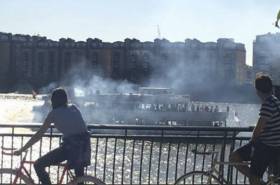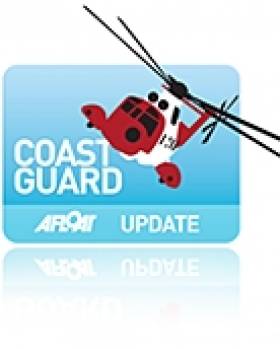Displaying items by tag: Thames
Boaters looking to cruise the inland waterways of Scotland and England are advised of low water levels in canals and rivers across Great Britain.
The Canal & River Trust, Environment Agency and Scottish Canals have recently circulated updates to all boaters warning of low water levels in parts of Scotland, the north of England and the Thames.
Having already closed some locks temporarily and introduced reduced operating times in place on several other waterways, the Canal & River Trust is taking action to manage the very low water levels in the north of England.
However, it says further difficult decisions are now needed to conserve water. It is reported that additional temporary closures will be needed in August unless there is a significant improvement in water levels.
A combination of a dry spring that has continued into a hot, dry summer and essential reservoir repairs taking place across the region meant that the amount of available water was already less than usual, causing water supplies in the north to drop to historically low levels.
Although water management has been operation in some locations since the start of April and despite volunteer lock keepers helping to manage boat traffic at lock flights to ensure water supplies are used as efficiently as possible, the lack of rain has meant the reservoirs have not had a chance to refill and there is not enough water to supply the canals, the trust says.
It is now asking boaters across the country, with the help of volunteer lock keepers, to be even more careful than usual to conserve water. Boaters can help by sharing locks where possible and making sure paddles are fully closed after use.
To find out about stoppages and water levels affecting navigation, visit the Canal and River Trust website.
In Scotland, water reserves are also coming under pressure on the Lowland Canals with leakage issues through and around a number of historic lock gates on the Forth & Clyde Canal, compounding the issue.
The Scottish Canals operational team says it is struggling to maintain water levels at a number of locations, in particular on the eastern side of the canal between Lock 16, Camelon and The Kelpies.
All unnecessary trips through the Falkirk flight are currently being restricted, since noon last Tuesday 19 July. This will affect mainly holiday hire boats and leisure boats visiting The Kelpies for an overnight stay. Sea-to-sea transits will be maintained and should be booked through the boat movements team as normal. Scottish Canals says the restriction will be lifted as soon as it is safe to do so.
Water levels are also a concern in England’s southeast, with the Environment Agency asking users of the non-tidal Thames to make sure locks are as full as possible when used to save water.
Some parts of the upper Thames are already experiencing very low flows, especially in backwaters and tributaries. Above Iffley Lock the agency cannot guarantee the navigation channel will always be sufficiently deep for craft with a draft of 0.9m or more. And it warns that it may become necessary to close locks outside of normal lock-keeper hours of duty.
The aim is to avoid emptying locks unless they contain at least one boat as a considerable volume of water is released downstream each time a lock is used, the EA says. It is also encouraging boaters to plan ahead to minimise the use of locks along their journey.
See the ‘Information for boaters’ section of the EA website for updates, and subscribe to get advised of any Thames river restrictions and closures by emailing [email protected].
The RYA adds that there are expected to be further warnings for low water levels in these and other areas in the coming weeks. Boaters using the inland waterways are encouraged to plan ahead and to check local water reports before travel.
Passenger Boat With Engine on Fire Crashes into Pier at Canary Wharf
A passenger boat with 148 people on board has crashed into a pier on the River Thames with its engine on fire.
Dramatic footage (below) showed the pleasure boat hit a wooden pier at Canary Wharf with smoke billowing from the stern.
Emergency services were alerted to the incident shortly after 4pm, and although three people were checked at the scene none were injured.
Trinity House, the elegant UK working home of the General Lighthouse Authority opposite the historic Tower of London on Tower Hill, has teamed up with caterers and the powerboat charter company, Solent Rib Charter, to offer bookers an exciting senior corporate management team building package incorporating a light breakfast followed by a thrilling 'Thames Rib Blast' on the River. The Ribs can accommodate up to eight guests per boat and while the duration of the ride is flexible, most opt for a two-hour 'Blast' through Central London and/or to the Thames Barrier and back. Participants then return to the House for a first-rate champagne lunch catered by palette. Delegates will be welcome to leave personal items/luggage at the House while on the River.
The 'Blast' package is charged at a (non-negotiable) £1,988 + VAT (i.e. £248.50 per person at full capacity) per boat and includes exclusive venue hire and the two - three hour Thames River 'Blast' (irrespective of final numbers). The breakfast and post-Blast lunch is charged separately starting from an additional £167 + VAT per person for a minimum of eight participants. (Fewer numbers can be catered for a slightly increased charge).
Following a light continental breakfast, participants make the short walk to St. Katherine's Dock passing the moat of the Tower of London where the memorial Poppies were so spectacularly displayed. After donning protective clothing - guests are provided with breathable oilskins for warmth - guests will embark on a Rib for a morning of high-speed thrills (but no spills) zipping past some of the City's most famous river-side buildings such as the Houses of Parliament, London Eye, The Shard, and Old Billingsgate etc. The Ribs operate in even the most choppy and chilly conditions and can be seen on the River all year round. A celebratory lunch comprising seasonal items (such as Basil Panna Cotta to start followed by Gressingham Duck Breast as a main with Elderflower Tart for dessert) with accompanying wines and/or champagnes served by uniformed staff will be waiting the triumphant team on return to the House, rounding off an unforgettable half day on the Thames.
All bookings are subject to availability and general booking terms and conditions of Trinity House, Solent Rib Charters, and Palette.
Nine Injured In Thames Cruise Collision
#TowerBridge - BBC News reports of nine people injured after a sightseeing boat crashed into Tower Bridge on the River Thames in central London yesterday morning (Wednesday 4 June).
Five were hospitalised after the included, including a 64-year-old woman believed to have suffered head and pelvic injuries when she fell down steel steps in the collision.
Two more were checked on scene by paramedics and given the all clear, while two others made their own way to get treatment.
The vessel in question, the Millennium Diamond, continued after the crash with only minor damage sustained to St Katharine Docks just east of Tower Bridge, where emergency crews took the injured ashore.
Mail Online has more on the story including images from the scene HERE.
Uk Coastguard Announces Public Meeetings to Discuss Modernising Service
The purpose of the meeting is to provide an opportunity for the local communities around the existing Maritime Rescue Coordination Centres (MRCCs) to hear more about the proposals, ask questions of MCA representatives and have the opportunity to express their views.
Each meeting will be independently chaired and will begin at 7:30pm, expecting to draw to a close by 9pm.
Humber - Monday, 21 February 2011, The Spa, South Marine Drive, Bridlington, East Yorkshire. YO15 3JH
Thames - Tuesday 22 February 2011, Columbine Centre, Princes Esplanade, Walton on the Naze, Essex. CO148PZ
Yarmouth - Wednesday 23 February 2011, Great Yarmouth Town Hall, Hall Plain, Great Yarmouth, Norfolk. NR30 2QF
Aberdeen - Wednesday, 23 February 2011, Pittodrie Stadium, Pittodrie Street, Aberdeen. AB24 5QH
Forth - Thursday, 24 February 2011, Waid Academy, St Andrews Road, Anstruther, Fife. KV10 3 HD
Dover – Thursday, 24 February 2011, Dover Town Hall, Biggin Street, Dover, Kent. CT16 1DL
Shetland - Monday, 28 February 2011, Town Hall, Upper Hillhead, Lerwick, Shetland. ZE1 0HB
Stornoway - Tuesday, 1 March 2011, Nicholson Institute, Springfield Road, Stornoway. HS1 2PZ
Solent - Tuesday 1 March 2011, Thorngate Halls (Community Centre), Thorngate Halls, Bury House, Bury Road, Gosport, Hampshire. PO12 3PX
Holyhead - Wednesday, 2 March 2011, Holyhead High School, Alderley Terrace, Holyhead, Gwynedd, Isle of Anglesey. LL65 1NP
Clyde - Wednesday 2 March 2011, Port Glasgow Town Hall, 35 King Street, Port Glasgow. PA14 5HD
Belfast - Thursday, 3 March 2010, Marine Court Hotel, 18-20 Quay Street, Bangor. BT20 5ED
Liverpool – Thursday, 3 March 2011, Southport Convention Centre, The Promenade, Southport. PR9 0DZ
Milford Haven – Friday, 4 March 2011, Cleddau Bridge Hotel, Essex Road, Pembroke Dock. SA72 6EG
Swansea – Monday, 7 March 2011, Marriott Hotel, Maritime Quarter, Swansea. SA1 3SS
Portland - Tuesday, 8 March 2011, All Saints Church of England School, Sunnyside Road, Wyke Regis, Weymouth. Dorset, DT49BJ
Falmouth – Wednesday 9 March 2011, Tremough Campus, Treliever Road, Penryn, Cornwall. TR10 9EZ
Brixham - Thursday, 10 March 2011, Brixham College, Higher Ranscombe Road, Brixham. TQ5 9HF
Kirkwall - Tuesday, 15 March 2011, Town Hall, Broad Street, Kirkwall. KW15 1DH
Ullapool – Wednesday, 16 March 2011, Macphail Centre, Mill Street, Ullapool, Ross-shire. IV26 2UN
The details of these proposals, together with the consultation documents, can be found on the MCA website at www.mcga.gov.uk.
































































